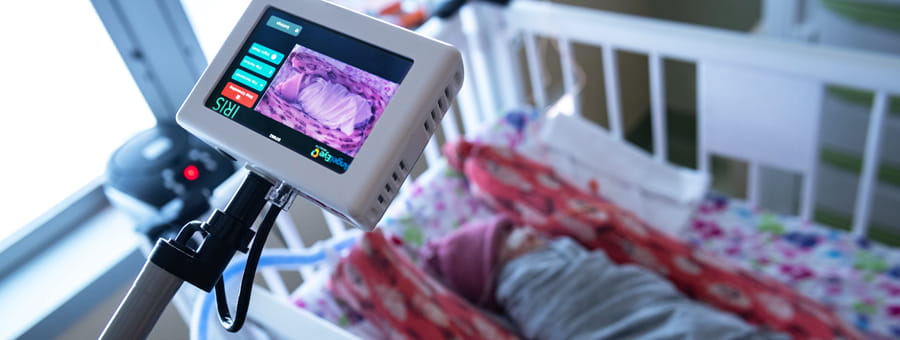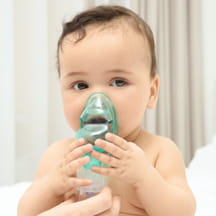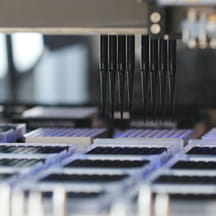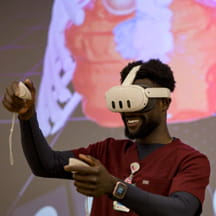When Mandi Ballard gave birth to twins 24 weeks into her pregnancy, her babies faced a long medical journey before they’d be ready to go home. Not only were they experiencing “a lot of the typical preemie issues,” according to Mandi, but her daughter also had neurological complications while her son struggled with respiratory problems.
More than four months later, Madelyn and Madox are healthy and finally at home with Mandi and her husband, Kevin. While the twins’ stay at the Level IV Neonatal Intensive Care Unit (NICU) at Children’s Health in Dallas, Texas, was certainly stressful for their parents, the hospital’s NICU cameras helped to alleviate some of that anxiety. The technology provided access to secure live video of their infants in the NICU at any time, from anywhere.
Children’s Hospitals Today talked with Mandi on the eve of her babies’ homecoming to talk about her NICU experience and how the cameras helped her family.
Watching your babies spend the first four months of their lives in the NICU must have been incredibly difficult—how did having access to the cameras help your family?
It's never easy to leave them in the NICU because that's not the way it's supposed to go—you're supposed to take your baby home with you. That separation is very hard.
We put 100% of our trust into the nurses and doctors from the beginning; the cameras have given us an extra layer of trust. It’s the added comfort of knowing they’re okay, and the nurses are making them comfortable because we can see they’re comfortable. It's comforting for us to see they’re receiving great care.
The nurses always say, "You can call anytime," but sometimes if I wake up in the middle of the night or if I'm working during the day, I don't necessarily want to call—I just want to check in on them. It's been so comforting to be able to see them cuddling and sleeping.
Having the cameras also gave the nurses a way to communicate with you, too?
Oh yes. I remember the first time one of the nurses left a note for us in front of the camera. We had been waiting all day for Madelyn to poop. Finally, she made quite a mess and the night nurse put a funny little note in her crib about it. I woke up in the middle of the night and I saw it; it was awesome and really put me at ease—and it was also great that the nurse had a sense of humor.
Madelyn's also been working on taking bottles. I want to call up there every time she’s taking one to know if she’s finished it, but instead the nurse will just put a sign in her bed that says, "I took all my bottle."
It's just a sweet thing. It is hard when we can't be there, but it makes me feel happy to know they are so well cared for. I love those little notes—they show me that the nurse is being thoughtful and gives me a little glimpse into their day.
How important were the cameras in helping your family from a logistical standpoint?
When we first started this journey, COVID-19 was in full force. My husband and I were the only ones that could go see them, so we gave camera access to a select few people who wanted to see them. The grandparents are still on frequently—they'll look at them and pray with them. It's been a blessing to be able to share that with them.
My husband and I are both back at work now, so we rely on the cameras even more now than we did when we were up there all the time. And recently we had some ice storms here in Dallas, so we couldn’t get up there. It’s so great to be able to see them when we’re not able—for whatever reason—to be there in person.
The other side of this is that the nurses are busy taking care of babies. So, when you call them, they might not always have the time to get on the phone to provide updates. They're doing their jobs taking care of babies, so for us to be able to check in ourselves without disrupting their work is important too.
There was a brief period when the babies first arrived at Children’s Health that the cameras were not operational. How much of a difference did it make when you were able to check in on them remotely?
Honestly, I really hated that time when we didn't have the cameras. It wasn't very long, but we had to experience that—I can't imagine going through this whole experience that way.
There are so many people I’ve talked to who have gone through the NICU previously and have not had the cameras and wish they had because they feel like it would've made the experience a little bit easier to get through. Especially for families who live far away from the hospital—I can't imagine that situation.
I just hope at some point, these cameras will be in every NICU. This experience is already challenging enough—anything that makes it a little easier on the parents certainly helps tremendously.



